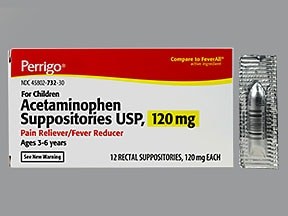
Contents
Acetaminophen Rectal Suppository: Fast Relief from Fever and Pain
Acetaminophen rectal is an over-the-counter (OTC) medication that provides temporary relief for fever, minor pains, aches, and headaches. It is specifically designed for individuals who are unable to take oral medications. Unlike other pain relievers, acetaminophen rectal does not reduce swelling or inflammation.
This medication works by inhibiting the cyclooxygenase (COX-1 and COX-2) enzymes in the central nervous system (CNS) responsible for generating pain impulses. By doing so, it blocks the synthesis of prostaglandin, a natural substance that triggers inflammation and the release of inflammatory substances. Acetaminophen rectal also acts on the hypothalamus region of the brain, which regulates body temperature, reducing fever.
Warnings
- Avoid using acetaminophen rectal if you are hypersensitive to any of its components.
- Consult your physician before using OTC acetaminophen rectal if you have liver disease.
- Speak with your physician before using acetaminophen rectal if you are taking blood-thinning medication like warfarin.
- Chronic high doses of acetaminophen rectal or excessive alcohol consumption can increase the risk of liver damage.
- Use acetaminophen with caution if you have G6PD enzyme deficiency, a genetic disorder.
- Rare reports of life-threatening skin reactions such as Stevens-Johnson syndrome (SJS), toxic epidermal necrolysis (TEN), and acute generalized exanthematous pustulosis (AGEP) have been noted. Discontinue treatment if you experience blistering, rash, or redness.
Side Effects of Acetaminophen Rectal
Common side effects include:
- Rectal discomfort
- Hypersensitivity reactions, including:
- Pruritic maculopapular rash (itchy rash with red bumps)
- Urticaria (hives)
- Angioedema (swelling under the skin or mucous membranes)
- Anaphylaxis (severe hypersensitivity reaction)
- Laryngeal edema (swelling of the voice box)
- Other side effects:
- Agranulocytosis (severely low level of granulocyte immune cells)
- Leukopenia (low count of leukocyte immune cells)
- Neutropenia (low count of neutrophil immune cells)
- Pancytopenia (low count of all types of blood cells)
- Thrombocytopenia (low platelet count)
- Thrombocytopenic purpura (easy bruising and bleeding due to thrombocytopenia)
If you experience any of the following symptoms or serious side effects, contact your doctor immediately:
- Serious heart symptoms: fast or pounding heartbeats, fluttering in your chest, shortness of breath, sudden dizziness
- Severe headache, confusion, slurred speech, severe weakness, vomiting, loss of coordination, feeling unsteady
- Severe nervous system reaction: very stiff muscles, high fever, sweating, confusion, fast or uneven heartbeats, tremors, feeling like you might pass out
- Serious eye symptoms: blurred vision, tunnel vision, eye pain or swelling, seeing halos around lights
This is not an exhaustive list of side effects. Speak to your doctor for medical advice or if you experience any adverse reactions. Report side effects or health problems to the FDA at 1-800-FDA-1088.
QUESTION
What are the dosages of acetaminophen rectal?
Suppository
Adult:
Antipyretic/Analgesic
- 325-650 mg rectally every 4-6 hours as needed
- Not to exceed 4 g/day
Pediatric:
Antipyretic/Analgesic
- Children 3 months to 1 year: 80 mg rectally every 6 hours as needed
- Children 1-3 years: 80 mg rectally every 4 hours as needed
- Children 3-6 years: 120 mg rectally every 4-6 hours as needed
- Children 6-12 years: 325 mg rectally every 4-6 hours as needed
- Children over 12 years: Same as adults; 325-650 mg rectally every 4-6 hours as needed
Maximum daily dose:
- Children under 12 years: Not to exceed 5 doses/24 hours
- Children over 12 years: Not to exceed 4 g/day
Administration
- Lie on the left side with knees bent
- Remove protective wrap before inserting
- Insert the tip gently into the rectum with a slight side-to-side movement, pointing the tip toward the navel
Overdose
- An acetaminophen overdose can cause liver damage and severe adverse effects. Symptoms may include nausea, vomiting, loss of appetite, sweating, abdominal pain, tiredness, yellowing of eyes and skin, dark urine, agitation, confusion, hallucinations, and seizures. Acetaminophen can also be toxic to the kidneys.
- Treatment for overdose may involve administration of N-acetylcysteine (NAC), an antidote to acetaminophen, along with other measures as required.
Drug Interactions
Inform your doctor about all the medications you are currently taking to check for any potential drug interactions. Do not start, discontinue, or alter the dosage of any medication without consulting your doctor.
- Acetaminophen rectal has no severe interactions with other drugs.
- Serious interactions may occur with:
- Lonafarnib
- Avapritinib
- Axitinib
- Eltrombopag
- Finerenone
- Flibanserin
- Imatinib
- Isavuconazonium sulfate
- Isoniazid
- Ivacaftor
- Lemborexant
- Levonorgestrel oral/ethinylestradiol/ferrous bisglycinate
- Lomitapide
- Midazolam intranasal
- Mipomersen
- Tazemetostat
- Tetracaine
- Tinidazole
- Warfarin
Note that these drug interactions are not exhaustive. For more information, use the RxList Drug Interaction Checker or consult your doctor or pharmacist.
Always inform your doctor, pharmacist, or healthcare provider about all prescription and over-the-counter medications you are using, including the dosage. Keep a record of this information. If you have any questions about the medication, consult your doctor or healthcare provider.
Pregnancy and Breastfeeding
- Acetaminophen crosses the placenta and can be used for short-term relief during pregnancy.
- It is compatible with breastfeeding, but caution is advised.
- Always consult your healthcare provider before using any OTC drugs, including acetaminophen rectal, during pregnancy or while breastfeeding.
Other Important Information
- Acetaminophen rectal is for rectal use only; do not swallow.
- Use acetaminophen rectal exactly as prescribed or follow the label instructions for OTC acetaminophen suppositories.
- Avoid exceeding the recommended dosage or using it more frequently than advised. Do not use for extended periods.
- Check product labels to prevent overdose. Acetaminophen is found in various forms and combination products. If unsure, consult a pharmacist or physician.
- Discontinue acetaminophen rectal immediately if you experience hypersensitivity reactions.
- Contact your healthcare provider if your fever lasts longer than 3 days or recurs, or if pain lasts longer than 5 consecutive days or recurs.
- Discontinue use and consult your physician if you develop severe skin reactions.
- Avoid or limit alcohol consumption while using acetaminophen rectal.
- Keep acetaminophen rectal out of the reach of children.
- In case of overdose, seek immediate medical assistance or contact Poison Control.
By clicking Submit, I agree to the MedicineNet’s Terms & Conditions & Privacy Policy and understand that I may opt out of MedicineNet’s subscriptions at any time.
Summary
Acetaminophen rectal is a fast-acting suppository that relieves pain and fever. It is particularly suitable for individuals who cannot take oral medication. Chronic high doses or excessive alcohol consumption can increase the risk of liver damage. Side effects may include rectal discomfort, hypersensitivity reactions, and kidney toxicity. Pregnant individuals should use with caution, and breastfeeding individuals should consult a healthcare provider. Acetaminophen rectal is an effective and convenient option for relieving pain and fever.


